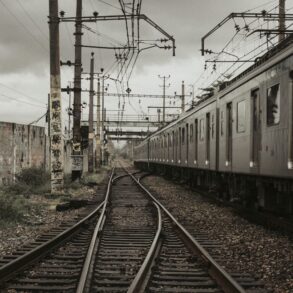The Mujib-Talsperre Dam, one of Jordan’s rare water sources. Photo by Zetaxeta, Wikimedia Commons Jordan is a country almost entirely lacking in natural resources. Although this may have allowed it to remain a stable hub in an otherwise shaky region, ever since the Arab-Israeli War in 1948 Jordan has seen a steady influx of refugees from neighbouring countries, speeding up the depletion of the country’s already scarce resources. What Jordan lacks most urgently is water. Unlike other Arab countries Jordan can’t use oil revenue to secure a potential water supply but will instead have to approach the problem in a conventional manner, albeit with almost no conventional resources.
Jordan is among the four most water scarce countries in the world, with a rising demand due to rapid population growth. According to the government’s National Water Strategy, Jordan’s population is set to double by 2025, causing the supply to decrease from 200 to 91 cubic metres per capita, while the current of 145 cubic metres per capita is already classed as “absolute water scarcity”. Most of the country’s water comes from twelve groundwater basins which are being depleted at twice the rate of recharge and are heavily affected by pollution. In addition, Jordan suffers from the “Egyptian syndrome” as countries upstream control the flow of the rivers running into the country.
Some measures have been taken towards a secure water supply: a national water strategy has been adopted, mainly focusing immediate attention on storage dams and wastewater reuse and, perhaps most importantly, the peace treaty reached between Jordan and Israel in 1994 includes a clause guaranteeing Jordan 215 million cubic meters of water from Israel through pipelines, and the two countries are holding advanced talks in an attempt to extend the existing deal, including a new desalination plant in Aqaba. However this may be hindered by the World Bank’s hesitation to grant Jordan a loan given the country’s unwillingness to cut certain subsidies.
Awareness of the water issue is high in Jordan. In rental apartments in Amman, water is often billed by the cubic meter – something quite odd for westerners with a seemingly endless water supply. But, like in most countries, adjusting to reality is hard for some. Many wealthy Jordanians wash their cars every morning and endless amounts of water are used for the sometimes failing street sanitation system. In addition, 60 % of Jordan’s water supply is used for agriculture while its share of the GDP is a mere 3 %, and according the National Water Strategy an astonishing 40 % of the water supply is lost due to a poorly functioning system.
As well as this harsh reality, there is yet another worry for the Jordanian government: the influx of Syrian refugees. Official statistics estimate that there are about half a million Syrian refugees in Jordan (even though Jordanians themselves often quote double that number) putting enormous pressure on a flawed system already under pressure. Hazem Nasser, Jordan’s minister of water said in an interview earlier this year that “we live in a chronic water problem, moving into a crisis triggered by the Syrian refugees”, and prime minister-designate Abdullah Ensour has said that the influx of Syrian refugees would be “catastrophic” for the country.
 A close-up view of the Za’tari camp for Syrian refugees as seen on July 18, 2013. Photo by U.S. Department of State, Wikimedia Commons
A close-up view of the Za’tari camp for Syrian refugees as seen on July 18, 2013. Photo by U.S. Department of State, Wikimedia Commons
The northern parts of the country are the worst affected due their proximity to the Syrian border, with many Syrians moving in to both conventional housing as well as the now unbelievably large Za’tari refugee camp. Water normally allocated to northern governorates has been shifted to refugee camps, and locals say that the water delivered by water truck once every fourteen days isn’t enough due to the influx of refugees, adding to the resentment of Syrians that already exists in Jordanian society today. To add to the worry concerning Jordan’s water scarceness, the Za’tari camp is located on top of one of the most important aquifers, and there are concerns that the recent rapid influx of almost 150,000 new residents will pollute the aquifer which would make an already critical situation even more catastrophic.
Apart from the direct humanitarian consequences of the water supply issue, these developments risk creating rifts within Jordanian society. Ever since independence the country has been receiving refugees from its neighbours, but hasn’t been able to fully integrate them. Many Palestinians are treated as pariahs, and many have yet to forget the tragic events during Black September. Syrians in Jordan are also widely discriminated against. Many Syrian engineers are working in Jordanian companies for secretaries’ salaries while doing an engineer’s work, in an attempt by the Jordanian government to keep the most important jobs for Jordanians.
The complex water supply issue may lead to further hostility towards the Syrian community in Jordan, potentially leading to conflict and marring Jordan’s long run of political stability. Jordan should be praised for their willingness to accommodate refugees, but harsh reality and the government’s failure to secure a future water supply and integrating refugees may well give these good intentions a cruel outcome.
JACOB BERNTSON




